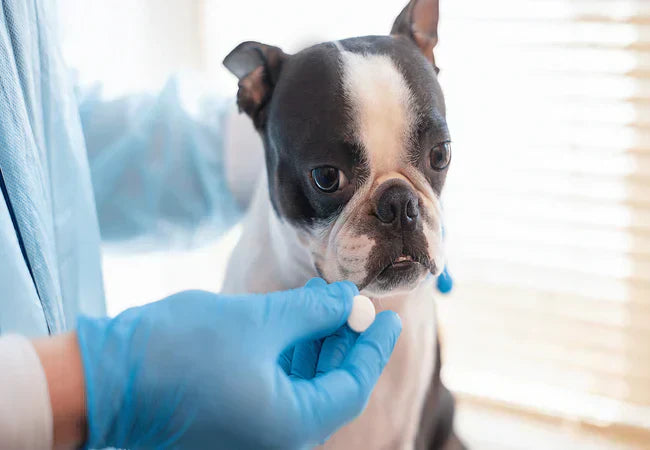Human Meds Safe for Dogs: 2025 Vet-Approved Medication Guide 💊🐕

In this article
🩺 Safe Human Medications for Dogs: A Comprehensive Guide for 2025 🐶
By Dr Duncan Houston BVSc
As pet owners, it's natural to want to alleviate our dogs' discomfort using readily available remedies. However, not all human medications are safe for canine consumption. This guide provides an in-depth look at over-the-counter (OTC) human medications that can be used for dogs, under veterinary supervision, to ensure their safety and well-being.
⚠️ The Importance of Veterinary Guidance
Before administering any human medication to your dog, it's crucial to consult with a veterinarian. Factors such as your dog's weight, age, breed, existing health conditions, and current medications can influence how they react to certain drugs. Self-medicating without professional advice can lead to adverse effects or worsen existing conditions.
✅ Commonly Used Human Medications for Dogs
Below is a list of human OTC medications that veterinarians may recommend for dogs, along with their typical uses:
-
Diphenhydramine (Benadryl): Used to treat allergies, insect bites, and motion sickness. Dosage is typically 1 mg per pound of body weight, administered 2-3 times daily. Note: Always ensure the product contains no added decongestants or alcohol.
-
Famotidine (Pepcid AC): Helps reduce stomach acid, aiding in the treatment of ulcers and gastritis. Dosage varies; consult your vet for appropriate amounts.
-
Loperamide (Imodium): Used for diarrhea control. Not recommended for certain breeds like Collies due to sensitivity. Veterinary guidance is essential.
-
Hydrocortisone 1% Cream: Applied topically for minor skin irritations and itching. Prevent your dog from licking the treated area.
-
Chlorhexidine: An antiseptic for cleaning wounds and preventing infections.
-
Artificial Tears (Lubricant Eye Drops): Provides relief for dry eyes. Ensure the product is free from additives like vasoconstrictors.
-
Canesten (Clotrimazole): Treats fungal infections, especially in the ears. Use as directed by a veterinarian.
-
Polysporin (Polymyxin B & Gramicidin): An antibiotic ointment for minor eye infections. Apply as per veterinary instructions.
-
Dimenhydrinate (Dramamine): Helps prevent motion sickness. Dosage should be determined by a vet.
- Plain Canned Pumpkin: Aids in regulating digestion and alleviating mild constipation or diarrhea. Use plain pumpkin, not pie filling.
❌ Human Medications to Avoid
Some human medications are toxic to dogs and should never be administered:
- Ibuprofen (Advil, Motrin): Can cause stomach ulcers, kidney failure, and other severe complications.
- Acetaminophen (Tylenol): May lead to liver damage and red blood cell destruction.
- Naproxen (Aleve): Associated with gastrointestinal ulcers and kidney issues.
- Decongestants (Pseudoephedrine, Phenylephrine): Can cause elevated heart rate, seizures, and death.
- Xylitol: A sugar substitute found in many products; highly toxic, leading to hypoglycemia and liver failure.
- Antidepressants (e.g., Effexor, Cymbalta): May cause neurological issues and other severe reactions.
🩺 Recognizing Adverse Reactions
After administering any medication, monitor your dog for signs of adverse reactions:
- Vomiting or diarrhea
- Excessive drooling
- Lethargy or hyperactivity
- Loss of appetite
- Seizures or tremors
- Difficulty breathing
If any of these symptoms occur, seek veterinary care immediately.
📞 Emergency Resources
In case of accidental ingestion or overdose, contact:
- Pet Poison Helpline: 1-855-764-7661
- ASPCA Animal Poison Control Center: 1-888-426-4435
📱 Utilizing Technology for Pet Health
Modern tools can assist in managing your dog's health effectively:
- Ask A Vet App: Access expert veterinary advice and schedule consultations conveniently.
- Woopf: Utilize training resources tailored to your dog's breed and behavior.
- Purrz: Monitor your dog's activity levels and set reminders for health check-ups and medication schedules.
🎯 Conclusion
While some human medications can be safely used for dogs under veterinary supervision, many others pose significant health risks. Always consult with a veterinarian before administering any medication to ensure the safety and well-being of your canine companion.
For personalized guidance and support, visit AskAVet.com and download the Ask A Vet app today! 🐾📲






